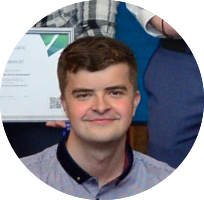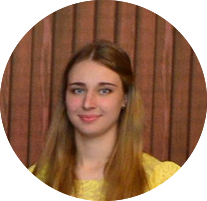First Cohort Graduates from the Joint Master’s Programme of HSE’s Faculty of Computer Science and Sberbank
The master’s programme 'Financial Technologies and Data Analysis' combines information technology, mathematics, and economics. The programme puts particular emphasis on hands-on experience: as early as the first year, half of the programme’s first-year master's students receive full-time employment in data science departments of financial companies.
Master’s students simultaneously study mathematical methods and algorithms (data science), software tools (data engineering) and the introduction of models in business practice. Alexey Masyutin, programme Academic Supervisor, explains how this curriculum helps students solve business problems:

‘The projects completed by the programme’s first graduates impressed both lecturers of the Faculty of Computer Science and Sberbank staff. Students undertook project tasks they were assigned at work: from analyzing audio recordings for scoring purposes to predicting changes in connection graphs of various objects (clients, companies). In my opinion, it’s a living dream to study what you can immediately put into practice. Now all second-year master’s students work in top banks—first and foremost, Sberbankand its affiliated companies, Evotor, Industry Transformation Technologies, and others. Our students also receive offers from Tinkoff, Alfa-Bank, Bank of Russia, various consulting companies (Deloitte, SAS), and FinTech startups such as 7 Seconds and Atlant FinTech.
I wish our graduates further success. And I advise that they keep in touch with each other — these contacts will be particularly valuable in the next three to five years.
Members of the programme’s first graduating class talked about their studies, why they chose 'Financial Technologies and Data Analysis', what opportunities the programme offers, and what they do now.

Dmitry Vaskin
I got accepted into the programme 'Financial Technologies and Data Analysis' thanks to my performance in the Olympiad. At the time, I was finishing up my undergraduate degree in 'Applied Mathematics and Information Science' and was planning on applying to the master's programme in ‘Data Science’. But then, suddenly the programme 'Financial Technologies and Data Analysis', which combines interesting courses and the opportunity to mix study with work, was launched.
The majority of the courses we took were in data science, starting with machine learning and econometrics, and ending with Bayesian methods and reinforcement learning. Some courses were held at the Yandex School of Data Analysis, and some were online. We also visited Sberbank Corporate University and learnt about various bank models.
During my first year, I worked as an intern at SAS. However I wanted to develop my skills in machine learning and predictive modeling. At the start of my second year, I got a job at Sberbank as a data scientist.

Anastasia Pestova
I’d been thinking about applying for a master's degree for long time: I was already working, but I wanted to gain additional expertise in another field. Sberbank provided an excellent opportunity to study for free—as long as you placed in the top 30. I did not participate in the Olympiad for graduates, so I took the entrance exams: mathematics, English and the interview. I remember how I came to the problem analysis before the first exam in mathematics. The programme Academic Supervisor attended the event and was so easy-going with all the students that I wanted to apply for the programme even more.
Fortunately, I successfully passed the exams and got into the programme. Soon I got an analyst position at a FinTech startup. Every day we have to solve various tasks related not only to machine learning, but also to the business management processes. In my first year I chose a Sberbank project as my term paper, which involved analyzing textual payment designations of corporate clients. I was surprised that the analysis was carried out on real data and will be used in an ongoing project of the bank.
New Features of the Programme
This year the programme of courses on deep learning and advanced Python for the creation of a service based on machine learning (ML model as a web service, dockerizing, deployment, parallel execution) will be expanded. In the second year of the programme, employees of the blockchain Laboratory of Sberbank, Konstantin Klimenko and Sergey Shayakhmetov, will join the course on the development of smart contracts - the division is piloting technologies for the bank's purposes.
The successful practice of writing term papers on Sberbank topics will remain. Master’s students will be offered more practice-oriented tasks at the project seminar, while the necessary theory on additional topics of machine learning will be taught during the research seminar.
How to Apply to the Programme
The programme is taught in Russian and English and is open to international applicants with sufficient proficiency in Russian language. International applicants may first enrol in HSE's international preparatory programmes to learn the Russian language and prepare for subject exams.
The entrance examinations for Master's programme applicants include a written exam in higher mathematics, an exam in English, and an interview. Demo versions of the exams, as well as the interview template, and examples of business cases can be found here (in Russian).
Admissions to HSE’s Master’s programmes are now open. International students can apply online. To learn more about HSE University, the programmes it offers, its admission process, or life in Moscow, please visit International Admissions website, or contact the Education & Training Advisory Centre at: inter@hse.ru, or via WhatsApp at: +7 (916) 311 8521.
Alexey Masyutin
Academic Supervisor of the Programme 'Financial Technologies and Data Analysis'

